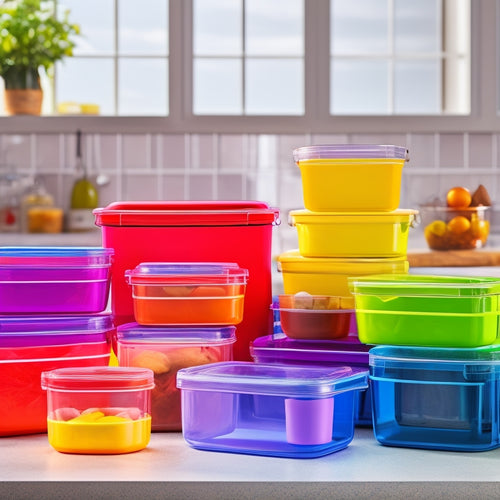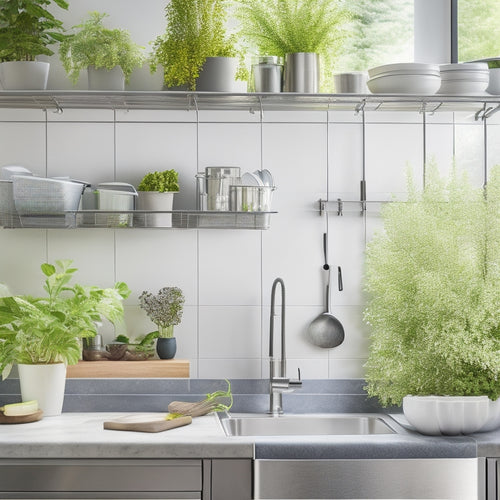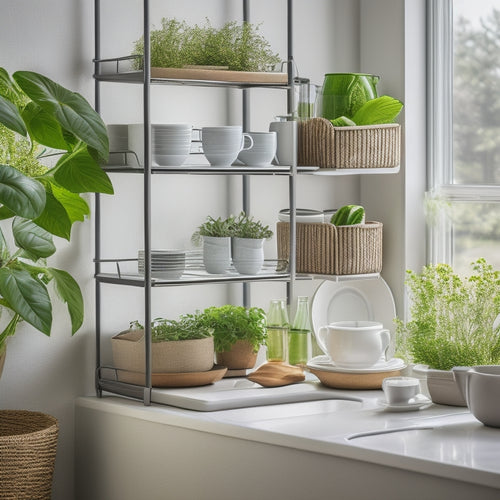
Revamp Your Kitchen: Embrace Plant-Based Living
Share
Revamping your kitchen for plant-based living involves more than just swapping out ingredients. It's a holistic approach to creating a space that inspires healthy habits and sustainability. Start by decluttering and organizing your kitchen to prioritize whole, plant-based foods. Stock your pantry with staples like fruits, vegetables, and grains, and explore local shopping options for fresh, high-quality ingredients. Equip yourself with essential tools like nut milk bags and a tofu press. As you shift, connect with like-minded individuals and share your journey to stay motivated. By embracing this lifestyle, you'll open up a world of flavors and possibilities that will transform your relationship with food and the planet.
Key Takeaways
• Declutter your kitchen by removing processed foods with dairy or meat and organizing cupboards and fridge for plant-based foods.
• Stock your pantry with whole foods, condiments, and spices, and plan meals around seasonal produce to build a foundation for healthy recipes.
• Explore local farmers markets, specialty stores, and online options to source high-quality, fresh plant-based ingredients and enhance grocery variety.
• Invest in essential kitchen tools, such as nut milk bags, tofu press, and salad spinner, to enhance plant-based meal prep efficiency.
• Share your plant-based journey by connecting with others online, attending local meetups, and documenting your progress to stay motivated and inspired.
Reset Your Kitchen Space
As you start on your plant-based journey, begin by giving your kitchen a thorough reset, transforming it into a space that supports and inspires your new lifestyle.
Start by decluttering your kitchen, removing any processed foods with dairy or meat, and organizing your cupboards and fridge into designated areas for plant-based foods. This kitchen organization will make meal planning and preparation a breeze.
Consider sectioning off areas for specific ingredients, like whole grains and beans, to streamline your cooking process. With a clean and organized kitchen, you'll feel more inspired to try new recipe ideas and experiment with different flavors and ingredients.
Take this opportunity to refresh your kitchen and set yourself up for plant-based success!
Stock Your Plant-Based Pantry
With a well-organized kitchen in place, it's time to stock your plant-based pantry with a variety of whole, nutritious foods that will form the foundation of your new lifestyle. Focus on whole foods like fruits, vegetables, whole grains, and beans, which will provide the building blocks for delicious and healthy plant-based recipe ideas.
Don't forget to include condiments, sauces, snacks, herbs, spices, fats, and sweeteners to add flavor and variety to your meals. Effective meal planning tips include planning your meals around seasonal produce, cooking in bulk, and using leftovers to reduce food waste.
Explore Plant-Based Shopping Options
When it comes to sourcing high-quality, plant-based ingredients, exploring local farmers markets and specialty stores can make all the difference in the freshness and variety of your groceries.
Visit local farmers markets to discover a wide range of organic produce, often at a lower cost than traditional supermarkets. For a more extensive selection, consider stores like Trader Joes, Whole Foods, and other organic-focused options.
Online options like Thrive Market also offer a vast array of organic brands, making it easy to shop from the comfort of your own home.
Essential Kitchen Tools and Equipment
Equipping your kitchen with the right tools and equipment is essential for efficient and effective plant-based meal preparation. A well-stocked kitchen not only saves time but also guarantees safety and hygiene.
To get started, focus on kitchen organization by designating specific areas for plant-based ingredients and utensils.
Here are three must-haves for your plant-based kitchen:
-
Nut milk bags: Perfect for straining plant-based milks and creating creamy textures.
-
Tofu press: A game-changer for preparing plant-based proteins like tofu, tempeh, and seitan.
-
Salad spinner: A quick and easy way to dry fresh greens for salads and other dishes.
Investing in these essential tools will enhance your plant-based meal prep and make cooking a breeze.
Share Your Plant-Based Journey
Now that you've equipped your kitchen with the right tools and ingredients, it's time to share your experiences and connect with others who are embracing plant-based living.
Share your favorite plant-based meal ideas and learn from others who are shifting to veganism. Join online communities, attend local meetups, or start a blog to document your journey. Sharing your experiences can be a powerful way to stay motivated and inspired.
Consider hosting a potluck dinner or cooking class to share your new skills with friends and family. By sharing your journey, you'll not only stay accountable but also help others who are just starting out.
Together, let's create a supportive community that celebrates the benefits of plant-based living.
Frequently Asked Questions
How Do I Meal Prep for a Busy Schedule on a Plant-Based Diet?
To meal prep for a busy schedule on a plant-based diet, focus on quick recipes and time-saving tips, such as overnight oats, slow cooker meals, and prep-ahead salads, while stocking up on grocery essentials like whole grains, beans, and versatile spices.
Can I Still Eat Out at Restaurants on a Plant-Based Diet?
When dining out on a plant-based diet, don't feel restricted; instead, explore vegan-friendly restaurants and modify favorite dishes by requesting substitutions or asking about plant-based options, ensuring a safe and enjoyable experience.
Are Plant-Based Alternatives to Dairy and Meat Really Healthy?
As we navigate the world of plant-based alternatives, it's important to scrutinize their healthiness, considering not only nutritional balance and ethical considerations but also environmental impact and taste preferences, to guarantee a well-rounded, guilt-free indulgence.
How Do I Get Enough Protein on a Plant-Based Diet Without Supplements?
To guarantee adequate protein on a plant-based diet, focus on high protein foods like beans, lentils, and tofu, and get creative with recipes incorporating protein-rich snacks like nuts, seeds, and legume-based meal ideas.
Can I Convert My Favorite Non-Plant-Based Recipes to Plant-Based Ones?
Did you know that 70% of recipes can be easily adapted to plant-based versions? By substituting ingredients and modifying recipes, you can recreate your favorite dishes while maintaining their flavor profiles, using creative substitutions like plant-based milks and vegan cheese.
Related Posts
-

Stackable Kitchen Containers for Modular Systems
Stackable kitchen containers for modular systems change your cooking space by maximizing vertical storage and enhanci...
-

Wall-Mounted Dish Drainer Racks for Kitchens
Wall-mounted dish drainer racks are a game changer for your kitchen. They maximize vertical space, freeing up preciou...
-

Tiered Dish Rack Organizers for Compact Spaces
Tiered dish rack organizers are perfect for compact spaces, maximizing vertical storage while saving precious counter...


